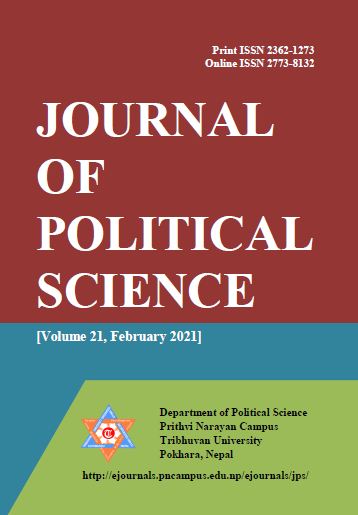The Dichotomy of Rights and Development: A Rights-Based Approach to Development in Nepal
DOI:
https://doi.org/10.3126/jps.v21i0.35264Keywords:
Social earthquake, zealous participation, primordial, neo-patrimonialismAbstract
In the post-constitution period of political and social upheavals, the process of inclusion and the role of democratization and federalism made new spaces for deliberations on caste/ethnicity, ethnic identity and rights quandaries, credibility and questioning of state authority and the challenge of societal hierarchy and conventional governance patterns in Nepal. The ‘Instrumentalist’ either self-aggravated exaggeration of political, social, economic, regional differences or the historically existing differences or discriminatory, exclusionary socio-economic and political practices being followed in Nepal led ethnic and marginalized caste groups elites and activists to be in ‘primordial’ row and struggle to scuffle for their group’s better position. Concurring to ethnographic representations of ethnic thoughts, actions and claims as socio-cultural veracity, this paper argues that the ethnic and marginalized groups demand for more rights, autonomy and better life that can be resolved with the adoption of rights based model of development via affirmative transformation of power relations between the rights holders (marginalized groups) and the duty bearers (state institutions). Both duty bearers and the rights holders will have a fervent role in assuring rights and development. This will enable to manage ethnic rows and ethnic/caste identities that can be linked with development by making institutions more inclusive and promoting social interaction between different communities and institutions.




